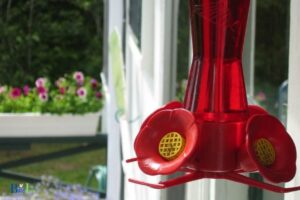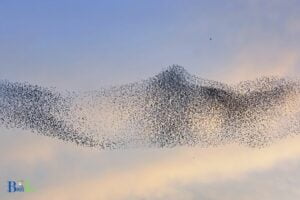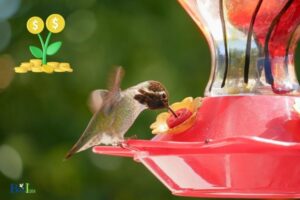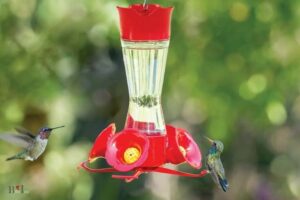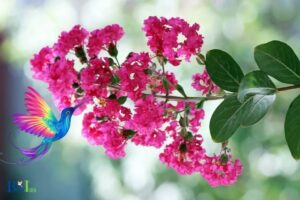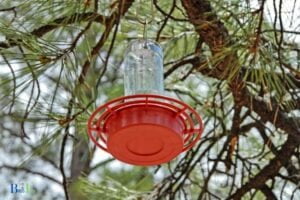What Time Of Day Do Hummingbirds Feed: Mor-Eve!
Hummingbirds feed throughout the day, but the majority of their feeding is done in the early morning and late afternoon.
Hummingbirds are diurnal creatures, meaning they are active during the day and rest at night. They need to feed frequently due to their high metabolism.
They begin their feeding routine at the break of dawn and continue till dusk, but more intense feeding is often observed during early morning and late afternoon hours, just before sunset, as these times coincide with the blooming of many flowers that hummingbirds feed on.
Hummingbirds have adapted to take advantage of the nectar and insects which are most available in the early morning and late afternoon.
They are relatively inactive during the middle of the day, when few flowers are blooming and insect activity is low.
6 Times of Day About Hummingbird Feeding Behaviors
| Time of Day | Hummingbird Feeding Behaviors |
| Dawn | Hummingbirds start feeding at dawn, taking advantage of the first nectar of the day. |
| Morning | In the morning, they feed frequently to replenish the energy spent during the night. |
| Midday | During the hottest part of the day, they often take a break from feeding. They stay in the shade to stay cool. |
| Afternoon | As temperatures drop, hummingbirds return to feed, storing energy for the evening. |
| Dusk | They have a major feeding just before dusk, storing enough energy to last them through the night. |
| Night | Hummingbirds do not feed at night; they go into a state called torpor to conserve energy. |
Key Takeaway
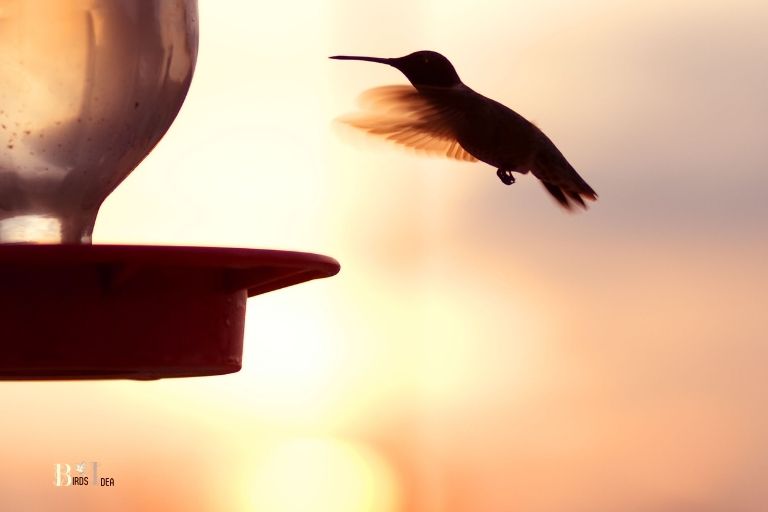
Five Facts About: Hummingbird Feeding
DID YOU KNOW
Hummingbirds consume more than half their body weight in nectar and insects daily.
birdsidea
What Time Do Hummingbirds Usually Feed?
Hummingbirds typically feed throughout the day, with peaks of activity occurring at sunrise and sunset. They consume nectar and insects as their main sources of sustenance.
Additionally, they drink and bathe in water. Some hummingbird species also enjoy eating sap from trees.
Here are a few benefits of Hummingbirds feed timing:

- Hummingbirds can take advantage of the higher temperatures and more plentiful food sources during the warmer daylight hours.
- Hummingbirds can benefit from being active during the safest times for them, when fewer predators are out.
- Allowing them to feed at other times of the day can help conserve energy for their nighttime hibernation.
- The extended daylight activities help the hummingbirds build up the fat reserves needed for their long-distance migrations.
What Is The Best Time To Feed Hummingbirds?

Hummingbirds need carbohydrate-rich, high-energy foods to sustain their hyperactive metabolisms. The best time to feed hummingbirds is during the early morning and late afternoon periods of low sunlight when they are most active.
Feeders should also be kept fresh and full of food, as hummingbirds prefer fresh food and will not accept old, stale food.
Here are the best times to feed hummingbirds:
- Before dawn, when the birds break their overnight fast
- In the middle of the day when they need a quick energy boost
- Around sunset, when they become active again
- Throughout the night, if you are willing to buy an automatic feeder
- Early in the morning when feeding opportunities are abundant
- Late afternoon when hummingbirds are actively searching for energy
- Late evening when some species of hummingbirds perch and sleep
- Whenever food is scarce such as during cold or dry seasons
- All-day long if you buy or make a tower or window feeder
- Whenever you notice that hummingbirds are especially active or abundant on your property.
“Hummingbirds are amazing and fascinating creatures who inspire us to persevere in difficult times and celebrate beauty in life.”
birdsidea
Do Hummingbirds Feed at Dawn and Dusk?
Yes, hummingbirds usually feed at dawn and dusk. Different species of hummingbirds may also feed during the night and early morning, as well as in the afternoon.
During the night, hummingbirds may roost and conserve their energy. They will search for nectar, small insects, and spiders during the day.
Do Hummingbirds Feed During The Day?
Yes, hummingbirds feed during during the day. They typically forage for food starting shortly after sunrise and ending shortly before sunset.
By hovering in the air and using their long, thin bills to reach into flowers, they typically consume small insects, spiders and a variety of nectar.
Hummingbirds may also feed on sap at suet feeders and hummingbird feeders with sugar-water solution.
Do Hummingbirds Feed At Night?
No, hummingbirds only feed during the day when they can find insects and nectar. They will not feed at night as they are not active at this time.

Factors affecting hummingbird feeding at night include:
Light: Hummingbirds are instinctively active during daylight hours, so night darkness makes it difficult for them to feed.
Vision: Hummingbirds rely on their eyesight to find food. Without the necessary light, they may be unable to spot food sources at night.
Insects: Since hummingbirds feed mostly on insects, they can’t find these sources in the dark.
Nectar: Hummingbirds rely on nectar for energy and survival, which can be difficult to find in the dark.
Weather: Hummingbirds generally won’t fly in freezing temperatures and heavy rain, making night feedings even more difficult.
Migration: Some hummingbirds migrate to colder climates in the winter months, meaning they may not have access to enough food to survive during the night.
In summary, hummingbirds do not feed at night due to factors such as limited light, vision, and access to insects and nectar. As such, hummingbirds rely on daylight feedings to meet their nutritional needs.
What Should Hummingbird Feeders Contain?
Hummingbird feeders should contain a mixture of sugar and water in the ratio of four parts water to one part sugar.
Hummingbirds also need access to clean water for drinking, bathing and cooling off.
Here is some information about what hummingbird feeders should contain:

- A mixture of four parts water to one part sugar
- An edible red dye, to attract the hummingbirds
- Cleaning supplies, to keep the feeder clean
- Flowers and trees nearby, to provide cover and food sources
- Hummingbird Nectar, a special food source for hummingbirds
- Insect control supplies, to keep the feeder free of pests
- Shelter, to provide protection to the birds
- An ant moat to keep ants away from the feeders
- Hummingbird bird houses, to provide a safe place to rest
- A place to hang the feeder, so it can be easily accessed
What Are The Benefits of Feeding Hummingbirds?
Feeding hummingbirds provides several benefits both for the birds themselves and for birders.
It can attract more hummingbirds to the area and keep them around long enough to be enjoyed and observed.

It also offers the birds a vital source of food and nutrition they need to survive, especially during migration or breeding seasons.
Here are the benefits of feeding hummingbirds:
Attracting hummingbirds to your yard – Hummingbird feeders filled with nectar are the easiest and most effective way to attract hummingbirds to a specific area.
Food source – Feeding hummingbirds is the best way to provide them with the energy they need to fly and hunt for food. As nectar eaters, hummingbirds rely on plenty of carbohydrate-rich food to survive.
Monitoring Hummingbirds – Providing a steady food source can encourage hummingbirds to stay in one place for an extended period of time, allowing birders to observe and monitor them.
Nutrients – Hummingbird food is more than just simple sugar water; it is enriched with essential micronutrients that the birds need to maintain their health and vitality.
Education – Setting up and caring for a hummingbird feeder helps to teach the public about the importance of caring for wild birds.
Fostering hummingbird conservation – Feeding hummingbirds reinforces the need for protecting habitats and encourages others to become involved in bird conservation.
FAQ of What Time Of Day Do Hummingbirds Feed
What time of day do hummingbirds typically feed?
What types of food are humminbirds attracted to?
How much food does a hummingbird need?
How often should I clean and refill hummingbird feeders?
What is the lifespan of a hummingbird?
Conclusion
Though hummingbirds feed throughout the day, they are most active when the sun is brightest. When the sun rises and before it sets, hummingbirds feed most frequently, mostly on nectar and insects.
By conserving energy during the middle of the day and taking advantage of the morning and evening insect and flower activity, hummingbirds maximize their energy intake for the day.

